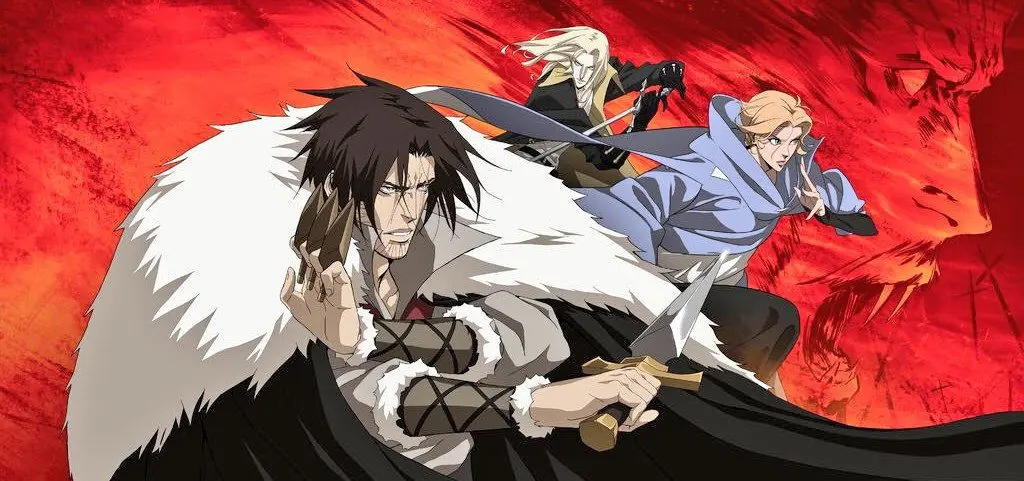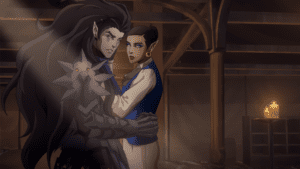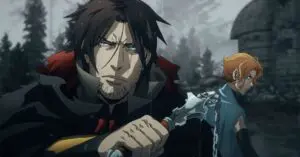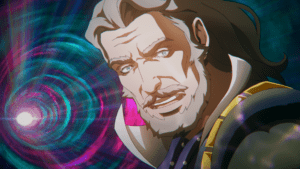Summary
Castlevania is back for its second season as we follow Trevor Belmont, Sypha and Alucard on their journey to stop Dracula once and for all. Alongside the normal dose of demon fighting we get more than a nip of vampiric politicking.
I’ve got a bit of a strange relationship with Castlevania as a whole. I would consider some of the games to be among my favourite of all time; Symphony of the Night is nearly flawless in my eyes. However, despite having invested many, many hours into a reasonable selection of the games, I know next to nothing about the lore behind the series. In fact, most of my understanding of the Castlevania-verse comes from Simon Belmont on Captain N: The Games Master and a novelisation of Castlevania II that I had as a child.
The first season of the Netflix Original Series Castlevania was interesting but never quite strayed over into essential viewing. At only four episodes it felt unfinished – things had only just started to get going and then all of a sudden it was over (there’s definitely a cheap joke in here somewhere). The second season does a much better job of developing well-rounded characters and actually giving everything more of a sense of scale and some stakes (pun very much intended).
Castlevania Season 2 picks up almost immediately after the first season ended, with Alucard (the half-vampire/half-human son of Dracula, played by James Callis) teaming up with Trevor Belmont (the last of a long line of vampire hunters who enjoys nothing more than a good drink and a stake, played by Richard Armitage) and Sypha (a speaker with some fairly substantial magical abilities, played by Alejandra Reynoso). The unlikely trio is pooling their resources, somewhat reluctantly, to try and take down Dracula (Graham McTavish) once and for all.
One of my biggest issues with the first season was that despite consisting of only four episodes it moved very slowly. The same is true to a degree in Castlevania Season 2, although we are at least getting eight episodes this time around. I’ve really enjoyed the series being given space to let the characters develop, but I’m still not convinced that the plot has been driven forwards enough, or satisfyingly, quite yet. Don’t get me wrong, I’ve really enjoyed Castlevania and the introduction of new characters along with a deeper look at returning favourites, but I just wanted them to actually do a little more.
Perhaps the most interesting development in this series is the focus on Dracula and his court of vampires. Dracula himself is an interesting character in that he’s not played as an entirely evil, malevolent force. Instead, he arguably has more humanity than some of the mere mortals we saw in season one. He just happens to want to eradicate humanity entirely because they killed his wife – while genocide might seem like a harsh punishment, you can at least see where he’s coming from. This isn’t an evil scheme because of… reasons; this at least feels consistent.
I had always assumed that the big D (that’s Dracula to everyone else) was the undisputed vampire king, but if Castlevania Season 2 has taught me anything it’s that vampire politics and human politics aren’t so different. There’s always somebody who wants to stab you in the back and score some cheap points. The main antagonist here is Carmilla (Jaime Murray) who is determined to whip up some discontent in the Dracula household. We also get introduced to Hector (Theo James) and Isaac (Adetokumboh M’Cormack), Dracula’s two human generals. I never actually realised Dracula even had humans on his team, let alone in positions of power. The more I learn about Dracula and the workplace environment he’s created, the more I like him – his pioneering work as an inclusive employer seems to have got lost to history. I think it’s a testament to my lack of understanding of the Castlevania lore that I had never heard of Carmilla, Isaac or Hector despite (as I’ve just learned) I’ve spent hours playing video games where they were fairly integral characters.
While Team Dracula definitely gets more screen time in Castlevania Season 2, we do get to learn a little more about our trio of heroes. There is more scope to dig deeper, particularly with Alucard, as they’re just outside of what I would consider traditional archetypes and so could cover some fairly interesting new ground. I really like the dynamic of the central trio but I still feel like we’ve only just scratched the surface.
I enjoyed Castlevania Season 2 a lot; it’s a really interesting show in its own right, and I am living proof that you don’t need to know anything about the games to enjoy it. It’s a fairly slow burn of a series, but it’s worth persisting with, and I’ll be interested to see where it can go next, providing it gets picked up for a third season.




